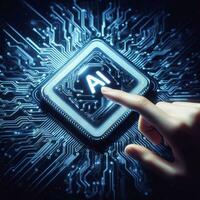Human vs AI: A Comprehensive Comparison
The rapid advancements in artificial intelligence (AI) have sparked endless debates about its capabilities, limitations, and implications. Central to these discussions is the comparison between humans and AI. While AI excels in computational efficiency and automation, humans possess unique qualities that machines cannot replicate. This article delves into the critical aspects of this comparison to provide a nuanced understanding of how human vs AI differ and complement each other.
Understanding Human Intelligence
Human intelligence is a complex interplay of cognitive, emotional, and social abilities. It encompasses creativity, problem-solving, empathy, intuition, and adaptability. Humans learn through experience, adapting to new and unpredictable circumstances while integrating abstract thinking and emotional understanding.
Key Features of Human Intelligence
- Creativity and Innovation: Humans can think outside the box, devising novel ideas and approaches to complex problems.
- Emotional Intelligence: Emotional understanding allows humans to form deep interpersonal connections and navigate social dynamics.
- Adaptability: Humans can adjust their behavior and thought processes in response to changing environments.
- Consciousness and Morality: Unlike machines, humans possess self-awareness and the ability to discern right from wrong based on moral principles.
Understanding Artificial Intelligence
Artificial intelligence refers to the simulation of human intelligence by machines. It includes machine learning, natural language processing, computer vision, and robotics. AI thrives in tasks requiring speed, precision, and data-driven decision-making.
Key Features of Artificial Intelligence
- Data Processing: AI can analyze massive datasets at incredible speeds, identifying patterns and generating insights.
- Automation: Repetitive and time-consuming tasks can be automated with high accuracy.
- Scalability: AI systems can be scaled to handle increasing volumes of work without fatigue or error.
- Predictive Analytics: AI leverages historical data to predict trends and outcomes.
Human vs AI: A Detailed Comparison
1. Intelligence and Learning
- Human Intelligence: Humans learn through experience, intuition, and reasoning. Their learning is unstructured and adaptable, enabling them to generalize knowledge across diverse situations.
- AI Intelligence: AI learns through data-driven algorithms, such as supervised, unsupervised, and reinforcement learning. However, its knowledge is domain-specific and lacks the ability to transfer learning effectively across unrelated fields.
2. Creativity
- Human Creativity: Humans excel in creating art, music, literature, and innovative solutions. Creativity stems from their ability to imagine and emotionally connect with their work.
- AI Creativity: AI can generate content like music, images, or text but relies on pre-existing data and patterns. It lacks genuine emotional connection or intentionality.
3. Emotional Intelligence
- Humans: Emotional intelligence is unique to humans, allowing them to empathize, build relationships, and understand social contexts.
- AI: While AI can simulate empathy through sentiment analysis, it does not possess true emotional understanding or consciousness.
4. Efficiency and Speed
- Humans: Humans are inherently slower in performing repetitive tasks but bring context and judgment to their decisions.
- AI: AI operates with unmatched speed and efficiency, processing millions of operations per second without fatigue.
5. Adaptability
- Humans: Human adaptability extends beyond immediate tasks, encompassing cultural shifts, emotional nuances, and abstract challenges.
- AI: AI adapts within its programmed framework but struggles with ambiguity or situations outside its training.
6. Dependence on Resources
- Humans: Humans rely on biological needs such as food, water, and rest.
- AI: AI requires computational resources, energy, and periodic updates but does not face physical limitations like fatigue.
Applications of AI in Human Lives
AI plays a transformative role in modern society, complementing human efforts in various domains:
- Healthcare: AI assists in diagnostics, drug discovery, and patient management.
- Finance: Predictive analytics and fraud detection streamline financial operations.
- Education: Adaptive learning platforms tailor educational content to individual needs.
- Transportation: Autonomous vehicles and traffic management systems enhance safety and efficiency.
- Entertainment: AI-driven recommendations personalize user experiences on streaming platforms.
Challenges and Ethical Considerations
While AI offers numerous benefits, it raises ethical questions and challenges:
- Bias in Algorithms: AI systems can inherit biases from training data, leading to unfair outcomes.
- Job Displacement: Automation threatens traditional job markets, necessitating reskilling initiatives.
- Privacy Concerns: Data-driven AI systems risk compromising individual privacy.
- Lack of Accountability: Determining responsibility for AI-generated decisions remains complex.
The Future of Human vs AI Collaboration
Rather than framing the debate as “Human vs AI,” a more constructive perspective is “Human and AI.” By leveraging their respective strengths, humans and AI can achieve remarkable synergy. Humans bring creativity, ethics, and emotional understanding, while AI contributes precision, speed, and scalability. Together, they can address complex global challenges in healthcare, climate change, and technological innovation.
Conclusion
The comparison between human vs AI highlights their distinct yet complementary strengths. While AI revolutionizes efficiency and data processing, humans retain unparalleled creativity, adaptability, and emotional intelligence. The future lies in fostering a harmonious relationship between the two, maximizing their combined potential for the greater good.


